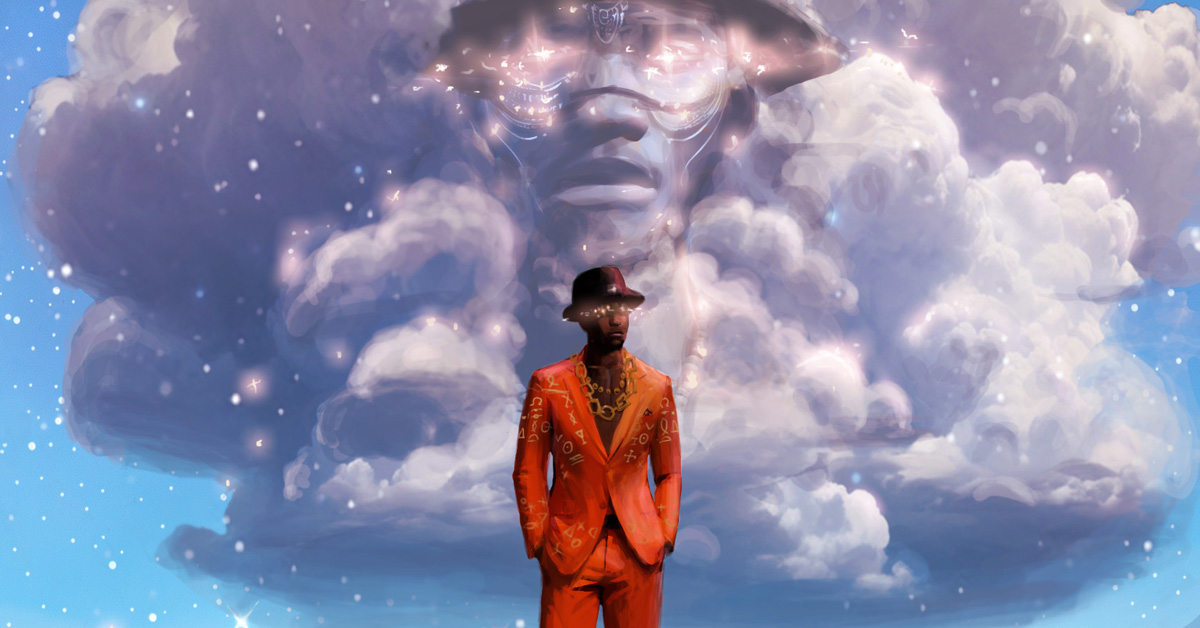Gods love a good party, and it is the scribe spirit’s duty to record everything: heavenly decrees, the songs of the angels, and even the gossip the harmattan spirits and sandstorms whisper to each other as they kiss. Anansi’s cousin, the spirit of drunkenness, who once lived on the earth as a human, tells the best stories at parties. But he has a hard time minding his cups, forgetting details and changing names and the order of events. What he doesn’t remember, he invents. The scribe spirit writes everything down as told. Anansi’s cousin recalls from wine-sloshed memory what unfolded when a planet called earth met its demise. One may very well be the truth:
I.
The earth grows mouths and swallows cities whole. This is how the world ends. I lived on earth as a human, and it is this voice through which I tell this story. The teething, as it is come to be known, begins at the borders like molars breaking through a toddler’s gums. The earth gazes upon borders, scowling at the invention. How absurd to partition its body into little hateful segments, putting up grotesque gates and barricades when the planet belongs to everyone and no one at once. The earth’s rage bubbles to the surface from its core, there were many on the planet who had never experienced some of its corners. Only those with blue and red booklets were granted the leave to go where they wished, the ones with green booklets caged like birds longing to fly south. The earth’s lava was saliva raining down on border towns like rivers of orange. The first major city to go is Lagos. The rest of the world hardly pays attention, treating it like another Ebola outbreak or civil war in a far away, eternally troubled place. Empathy only blooms for faces the colour of snow mushrooms, so the world blinks and continues about their day, sipping mimosas at overpriced brunch spots with grass walls. The world is arrogant against the earth, so the mouths spread across the continent, borders ripping open at the seams as they consume every major capital in their wake from Cairo to the Cape. Mouths open everywhere. Some small enough to eat a village, others the size of Johannesburg. No one takes the pandemic seriously until Amsterdam is gone. Seeing blonde, pale faces between jagged teeth is enough to bring the world to a halt and spring the UN and presidents into action, but it’s too late. Hot breath is already upon the Eiffel Tower. New York follows not too long after. Humanity had eaten through the earth like it wasn’t their only home, and now the earth was biting back. When it’s done, the earth licks its lips and belches, remembering the taste of the dinosaurs who once lived here many millions of years ago.
II.
Think of it as a bank. That is the easiest way to understand this ending. We cut out our hearts, put them in deposit boxes for safekeeping. The bank loans our hearts back to us for special occasions like weddings, births, and two-week vacations, but for the most part, our hearts remain behind vaults. Our minds and bodies go to work, churning profits like butter. We never get to taste the fruits of our labour, of course, so we imagine that they are salty like our sweat. Oh, how this world loves our sweat. The mind and body can do so much without a heart, and those who never give up their hearts to the bank suffer. The poets. The activists. The people who feel all the hurt in this world shatter, a crack that begins in the heart and fissures toward the mind. The rest of the world calls it a madness. But maybe madness is the only answer when the question asks you to choose between having a soul and surviving. Feelers is what we call them. This world tries to put them in a box, but big feelings should never be confined. They congeal and form a vortex, a black hole that sucks everything into itself. First to be consumed are the bankers, the custodians of death machines who crush spirit in well-ironed suits. Then, the politicians kissing babies with lies in their mouths and bombs in their hands. Next to go are the ones with eyes, but choose to sew them shut with sharp needles because eyes that see too much truth can break as well. The last ones to go are the ones with earplugs, such that the screams of children were nothing more than white noise.
III.
Our hubris tells us that we are the pinnacle of evolution, so imagine our surprise when wildfires became sentient, breaking out across the globe and refusing to be doused. Their primary form of subsistence is anything made by the hands of men. Highways, bridges, the Empire State Building. People form a prayer circle around the pyramids to protect them, but it is already too late. Every fossil burned fueled a fire that razes the land in retaliation. A call-and-response in a game of chicken. All is lost to the fire until hell is a place called Earth.
IV.
If the world doesn’t end by fire, then perhaps a god will send another flood. During the first flood, Noah built an ark and sailed around the world for a year, ignoring the cries of the drowning. But there were some who didn’t drown. The forsaken who sank to the bottom of the ocean and called upon another god with their last breath. This god answered, forming their bodies anew, stitching together their legs into tails and gills. A new species of human was born, living in the darkest bellies of the sea, unknown to the descendants of Noah. Centuries later, when the ships threw chained people overboard, the drowned were saved and welcomed into a new world. They minded their own business, staying out of the affairs of Noah’s descendants. That is, until the descendants of Noah poisoned their waters with their plastics and oil rigs. The forsaken called upon their god again, a wave of mermaids crashing upon the shore to retake the land where their forefathers once walked. The forsaken shall inherit the earth.
V.
The space whale is a creature that hibernates for a billion years after a good meal. It subsists on planets with life. It can eat lifeless planets, of course, but that’s like a meal prepared with no seasoning or oil. A young space whale wakes from its slumber, its rumbling belly urging it to feed. To the telescope’s lens, it looks like an asteroid, its breath a burning comet heading straight for Earth. How many living beings has our hunger eaten into extinction? It has no sympathy for us when it swallows us whole in one bite.
VI.
There is a planet of space-faring beings who’ve developed a taste for collecting. On their ships that look like large warehouses, they’ve reached the farthest reaches of the galaxies. When they happen upon our Milky Way they find it quite boring, all the planets in our solar system being lifeless globes with nothing for them to extract, to collect. They laugh at humanity for thinking life is one of a kind, that they are special, chosen by some higher being. Life is a weed, blooming wherever it pleases. For some reason, this weed only sprouted on one planet in this solar system. When they look upon earth, they pick a few things that they find to be curious oddities: a CD of Michael Jackson’s greatest hits and a roll of toilet paper. A team of analysts spends hours trying to decipher the combination of throat noises and instruments. They conclude that Michael Jackson must have been some spiritual leader and these are prayers stored in this disc. The analysts have yet to determine the purpose of the toilet paper. The running theory is that it is a popular decorative item for the household. The last thing they collect from our solar system is a star. The sun fascinates them, how its light is the spark needed to spring life on a single planet in the system. They must study it, understand how it works and show it to the rest of their people. They have the perfect glass container to display it at the Museum of the Intergalactic Oddities. They pack the sun away in their largest ship and blast off back to their home, leaving behind a wilting earth plunged into darkness.
VII.
Just as worlds end, they begin again. With a bang so big, its music is still heard in the spheres. Dinosaurs once lived here, and humans too. When the gods say let there be light, another will rise again, attempting to make sense of the dark between the stars.

Yvette Lisa Ndlovu
Yvette Lisa Ndlovu is a Zimbabwean sarungano (storyteller). Her debut short story collection Drinking from Graveyard Wells (University Press of Kentucky, Spring 2023) was selected for the 2021 UPK New Poetry & Prose Series.
She is pursuing her MFA at the University of Massachusetts-Amherst where she teaches in the Writing Program. She has taught at Clarion West Writers Workshop online and earned her BA at Cornell University. Her work has been supported by fellowships from the Tin House Workshop, Bread Loaf Writers Workshop, and the New York State Summer Writers Institute.
She received the 2017 Cornell University George Harmon Coxe Award for Poetry selected by Sally Wen Mao, and was the 2020 fiction winner of Columbia Journal’s Womxn History Month Special Issue and the 2021 Black Warrior Review Fiction Contest winner selected by K-Ming Chang. She is the co-founder of the Voodoonauts Summer Workshop for Black SFF writers. Her work has been anthologized in African Risen (Tordotcom Publishing, 2022) and has appeared or is forthcoming in F&SF, Tor.com, FANTASY Magazine, Columbia Journal, Fiyah Literary Magazine, Mermaids Monthly, and Kweli Journal. She is currently at work on a novel.

